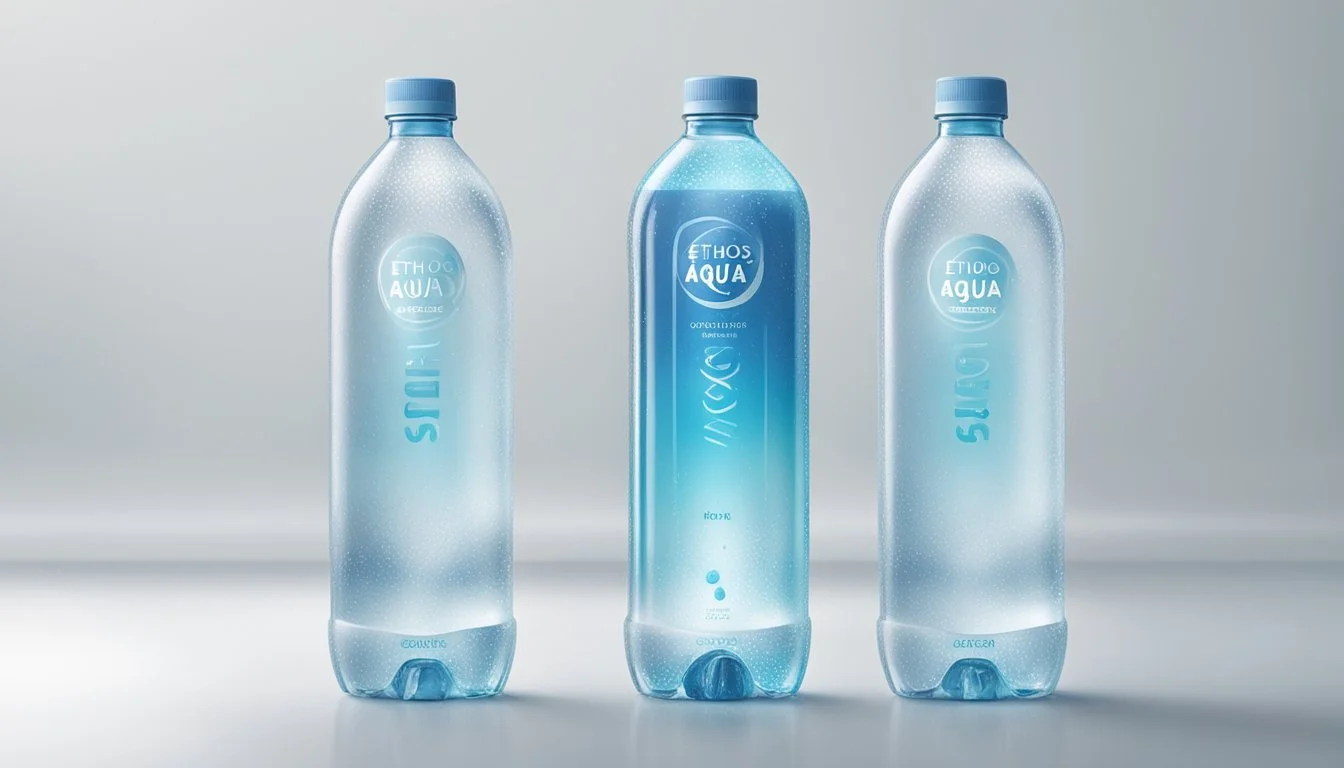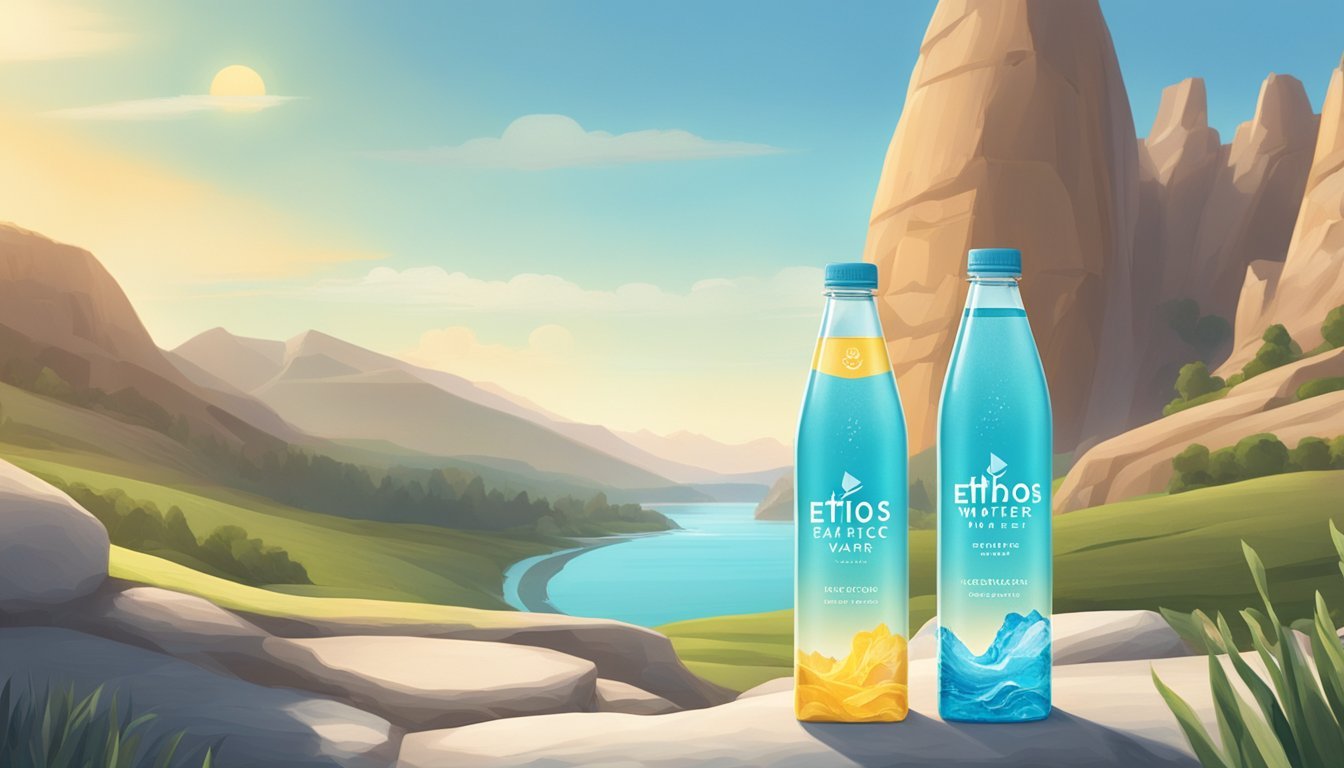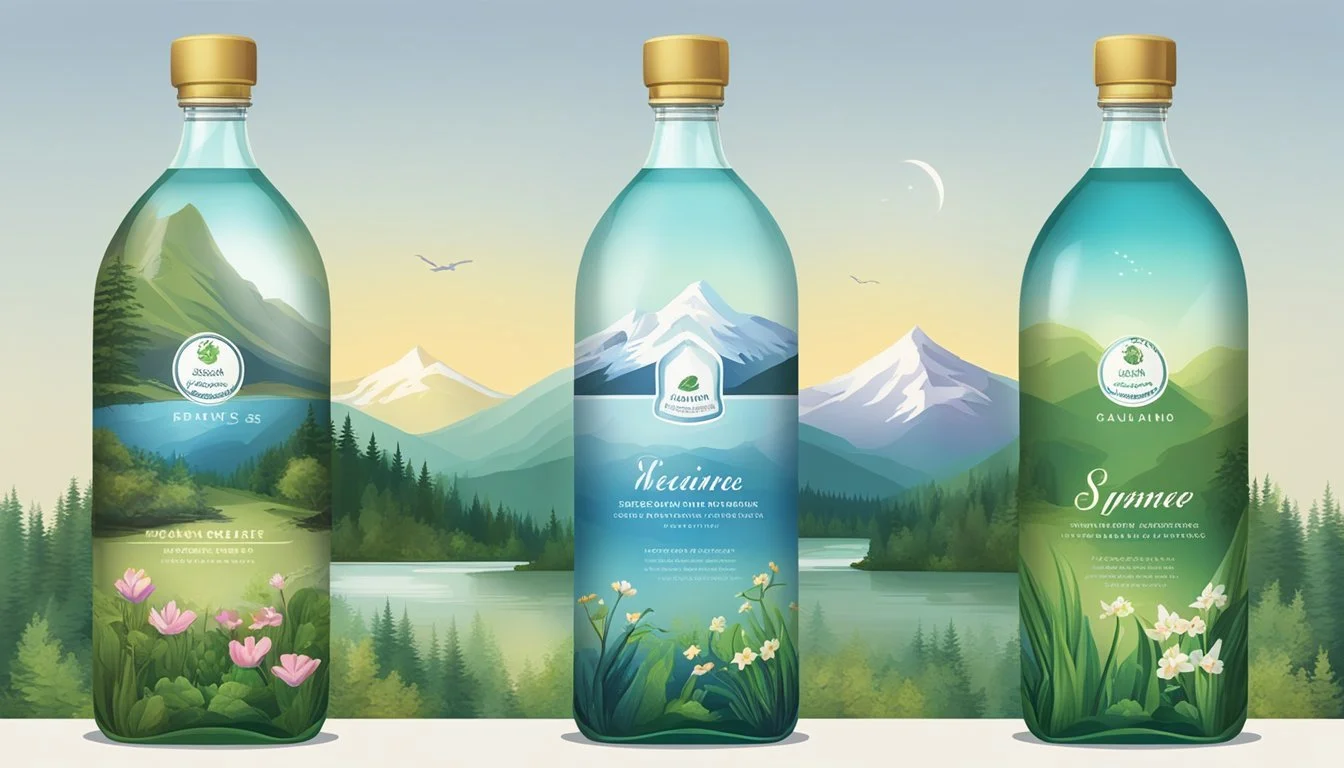Ethos vs. Aqua Carpatica
Which Bottled Water is Better? A Comprehensive Comparison
When considering Ethos Water and Aqua Carpatica, one might wonder which bottled water stands superior in terms of taste, quality, and overall value. Ethos Water is known not only for its clean taste but also for its commitment to philanthropy; a portion of its sales go towards funding clean water projects around the world. Meanwhile, Aqua Carpatica distinguishes itself with its nitrate-free composition and mineral-rich profile, offering a health-conscious option without a hefty price tag.
For those prioritizing a charitable cause alongside their hydration, Ethos Water presents a compelling choice. Conversely, Aqua Carpatica is for those who are mindful of mineral content and health benefits, favoring quality water without excessive costs. Both brands commit to using recyclable materials, aligning with broader sustainability movements in the bottled water market.
Ultimately, the choice between Ethos Water and Aqua Carpatica hinges on personal priorities—whether it's supporting global water initiatives or ensuring the purest hydration experience. Each brand brings unique strengths to the table, making them prominent contenders in the competitive bottled water market.
Understanding Bottled Water
Bottled water varies widely in terms of its source, treatment methods, and environmental impact. Types of Bottled Water, Bottled Water Regulation, and the Environmental Impact are crucial areas to explore.
Types of Bottled Water
Bottled water comes in various forms, each with distinct characteristics. Purified water undergoes processes like distillation or reverse osmosis to remove impurities. Spring water is sourced from natural springs and is usually untreated.
Mineral water contains naturally occurring minerals and must meet specific content standards. Sparkling water is infused with carbon dioxide, giving it effervescence. Still water is the most common type, devoid of carbonation.
Bottled Water Regulation
Regulations for bottled water are stringent but vary by region. In the United States, the FDA governs bottled water, ensuring it meets specific safety standards. Water must be tested regularly for contaminants like bacteria, heavy metals, and chemicals.
Labeling and marketing claims are also scrutinized. For instance, to be labeled as "spring water," the product must come directly from a spring source and be collected in a way that maintains its purity. In the EU, similar regulations under EFSA apply, with a focus on purity and accurate labeling.
Environmental Impact of Bottled Water
The environmental footprint of bottled water production and consumption is substantial. Manufacturing plastic bottles consumes significant amounts of oil and energy. Although many brands, like Ethos and Acqua Panna, use recyclable materials, the recycling rates are sometimes low.
Transportation of bottled water contributes to carbon emissions. Ethical considerations also surround the water extraction process, which can deplete local water sources. Charitable initiatives, like those by Ethos, aim to offset some impacts by funding clean water projects globally. Sustainable practices and consumer responsibility are keys to mitigating these environmental concerns.
The Journey of Ethos Water
Ethos Water starts its journey as purified water. This rigorous purification ensures the removal of contaminants, making it a safer and cleaner option for consumers.
Originating from various municipal sources, the water undergoes advanced filtration. This multi-step process includes microfiltration, reverse osmosis, and ozonation.
Ethos Water became part of Starbucks in 2005. Under Starbucks' ownership, it gained significant market presence. The brand's mission focuses on more than just hydration—part of the profits fund clean water initiatives.
Ethos packaging is designed to appeal to eco-conscious consumers. The bottles are made from recyclable plastic, reinforcing the brand’s commitment to sustainability.
Ethos Water is often found in Starbucks locations and various retail outlets. This widespread availability makes it a convenient choice for many consumers.
Ethos's branding highlights its dual commitment to quality and social responsibility, setting it apart in the crowded bottled water market. Its promise extends beyond satisfying thirst to making a positive impact.
The Origins of Aqua Carpatica
Aqua Carpatica originates from the Carpathian Mountains in Romania. These mountains, known for their wild, untamed beauty, are home to some of the purest water sources in Europe.
The water is sourced from deep springs within this ancient landscape. These springs are renowned for their clean, mineral-rich properties.
One of the standout features of Aqua Carpatica is its natural nitrate-free composition. High nitrate levels in water can pose health risks, so this aspect sets Aqua Carpatica apart. Additionally, it boasts a low sodium level, making it a healthy choice for hydration.
Located in the heart of Romania's unique scenery, Aqua Carpatica leverages the pristine conditions of the Carpathian Mountains to deliver premium mineral water straight from nature. The emphasis on purity and natural mineral content drives its appeal to health-conscious consumers.
The company’s commitment to preserving the natural beauty of the Carpathian region underpins its ethos. This respect for nature ensures that the water quality remains high and the environmental impact minimal.
Health and Hydration
Evaluating the health benefits and hydration advantages of Ethos and Aqua Carpatica requires examining their content of electrolytes and essential minerals. These components significantly influence the effectiveness and quality of hydration each brand provides.
The Role of Electrolytes
Electrolytes are critical for maintaining balanced hydration. Ethos bottled water contains a balanced mix, including sodium, potassium, and magnesium. These electrolytes assist in crucial bodily functions such as muscle contraction and nerve transmission.
Aqua Carpatica, known for its purity, also includes significant levels of calcium and magnesium. These minerals help regulate bodily fluids, maintain acid-base balance, and support cardiovascular health. The balance of these electrolytes in Aqua Carpatica can be particularly beneficial for athletes or individuals with high physical activity levels.
Essential Minerals in Water
Ethos places emphasis on its content of essential minerals like calcium and magnesium. These minerals support bone health, metabolic processes, and overall wellness. The brand also contributes to clean water initiatives, adding a feel-good factor to its health benefits.
Aqua Carpatica distinguishes itself with low sodium content, making it suitable for individuals monitoring their sodium intake for health reasons. In addition to calcium and magnesium, it includes other trace minerals that are vital for daily bodily functions. The pristine source of Aqua Carpatica water ensures minimal pollution and additives, preserving the integrity of its mineral profile.
Taste and Purity
Ethos and Aqua Carpatica each offer distinct experiences in terms of taste and purity, influenced by their respective sources and treatment processes.
Factors Affecting Water Taste
Source of Water: The primary factor affecting water taste is its source. Ethos Water aims to address global water shortages and sources its water from various locations. In contrast, Aqua Carpatica is sourced from the Carpatian Mountains, known for their pristine springs, contributing to its unique taste profile.
Mineral Content: Minerals like calcium, magnesium, and potassium significantly impact taste. Aqua Carpatica boasts being naturally nitrate-free and low in sodium, enhancing its appeal. Ethos Water’s taste can vary depending on the bottling location and water composition.
Purity and Contaminants: Both brands emphasize purity, but Aqua Carpatica's low nitrate levels set it apart. Water sommeliers often mention Ethos Water's mission-driven approach, which adds a subtle complexity to its taste, appreciated during taste tests.
Comparative Analysis of Ethos Water and Aqua Carpatica
Ethos Water and Aqua Carpatica are both prominent in the bottled water market but differ in their mineral content, pH levels, and taste profiles. This section investigates these differences to help consumers make an informed choice.
Mineral Content Comparison
Ethos Water highlights its purity and balanced mineral composition, including essential electrolytes such as calcium and magnesium. These minerals are crucial for hydration and overall health.
In contrast, Aqua Carpatica is renowned for its low sodium content, making it suitable for those monitoring their sodium intake. Additionally, Aqua Carpatica boasts being nitrate-free, which is beneficial for consumers concerned about contaminants.
Comparing the two, Aqua Carpatica provides a unique offering with its naturally occurring minerals sourced from the Carpathian Mountains, while Ethos Water combines a range of minerals to enhance its hydration benefits.
PH Level Assessment
The pH level of bottled water can significantly influence its taste and health benefits. Ethos Water usually maintains a neutral pH around 7, making it a balanced option for everyday consumption.
Aqua Carpatica, on the other hand, presents a pH range between 7.3 and 7.7. Its slightly alkaline nature can be advantageous for those seeking to balance their body’s pH levels.
Both waters emphasize purity with minimal contaminants. Ethos Water's neutrality makes it versatile for various uses, while Aqua Carpatica's alkaline pH provides potential benefits for those striving for a slightly alkaline diet.
Taste Profile
Taste is a subjective criterion but remains a crucial factor in choosing bottled water. Ethos Water offers a clean, crisp taste, reflecting its rigorous filtration process and balanced mineral content.
Aqua Carpatica, with its naturally occurring minerals, offers a distinctive yet smooth flavor. Its still variant is noted for its freshness, while the sparkling version provides a refreshing, effervescent experience.
For those preferring a subtle and refreshing taste, Ethos Water is a solid choice. If a more pronounced mineral flavor with options in both still and sparkling varieties is preferred, Aqua Carpatica stands out.
Environmental Considerations
When choosing between Ethos and Aqua Carpatica bottled water, it’s crucial to evaluate their environmental impact. Key factors include the sustainability of their packaging and efforts in water source conservation.
Sustainability in Packaging
Ethos uses materials that are recyclable, emphasizing eco-friendly practices. They incorporate a higher percentage of recycled plastic in their bottles, striving for lower environmental footprints. Their commitment extends to reducing plastic usage wherever possible.
Ethos also focuses on the charitable aspect, supporting clean water initiatives, which adds value to every purchase.
Aqua Carpatica opts for glass packaging over plastic, which is more recyclable and less harmful. Glass is free from chemicals found in plastic, making it a safer, sustainable choice. They avoid single-use plastics, further minimizing ecological damage.
Water Source Conservation
Ethos prioritizes the protection of water sources by engaging in clean water charitable programs. These initiatives aim to provide clean and safe water to underprivileged communities, ensuring the sustainability of water resources.
Conversely, Aqua Carpatica sources its water from naturally pure springs in the Carpathian Mountains. Their methods focus on maintaining the pristine condition of these springs. They avoid over-extraction and implement strategies to protect the local ecosystem, ensuring long-term conservation of their water sources.
Market Presence and Branding
Ethos and Aqua Carpatica have established themselves in the competitive bottled water market, each with unique approaches to branding and market presence.
Competitive Brand Analysis
Ethos is notable for its commitment to sustainability and charitable contributions. The brand emphasizes its recyclable packaging and efforts to support clean water initiatives globally, creating a socially responsible image. This strategy appeals to environmentally conscious consumers looking for brands that make a positive impact.
Aqua Carpatica differentiates itself with its focus on purity and health benefits. It promotes its nitrate-free water and reasonable pricing, making it accessible while still catering to health-oriented customers. This positions Aqua Carpatica as a premium yet affordable option.
Both Ethos and Aqua Carpatica face competition from established brands such as Fiji, Evian, Voss, Dasani, Aquafina, Smartwater, Nestlé, Icelandic Glacial, and Poland Spring. These brands have strong market presence, diverse product lines, and extensive distribution channels making market penetration challenging for new entrants.
Consumer Considerations
When comparing Ethos and Aqua Carpatica bottled waters, factors such as accessibility, pricing, origin, and availability are crucial for consumers to consider. These brands bring unique qualities and different approaches to the market.
Accessibility and Pricing
Availability of Ethos and Aqua Carpatica varies. Ethos water is widely available in many grocery stores and on Amazon. This broad accessibility ensures that consumers can easily purchase Ethos. In contrast, Aqua Carpatica is predominantly found in specialty stores and select online platforms, which may limit its reach.
Regarding pricing, Ethos water is positioned as a premium product with proceeds supporting clean water initiatives. This philanthropic angle can justify a slightly higher price for some consumers.
Meanwhile, Aqua Carpatica, known for its naturally nitrate-free and low sodium content, often commands a similar premium pricing. Its distinct mineral composition might appeal to health-conscious buyers despite its possibly limited availability.
Shoppers must weigh these aspects in their buying decisions, considering both the environmental impact and the charitable contributions associated with each brand.
Conclusion
Both Ethos Water and Aqua Carpatica offer unique advantages, catering to different consumer needs.
Ethos Water, known for its charitable contributions to clean water initiatives, provides a sense of social responsibility. Ethos also emphasizes sustainability with its use of recyclable bottles.
Aqua Carpatica, on the other hand, stands out for its nitrate-free benefits and reasonable pricing. It ensures a pure, clean drinking experience with Still Natural Mineral Water priced at 65p for 500ml and Naturally Sparkling Natural Mineral Water at 69p for 500ml.
Choosing between the two ultimately depends on what the consumer values more—social impact and sustainability, or quality and affordability. Readers are encouraged to weigh these factors based on their personal priorities to make an informed decision.
More About Ethos
Ethos vs Mountain Valley Spring Water: Which Bottled Water is Better?
Ethos vs Richard's Rainwater: Which Bottled Water is Better?
Ethos vs Whole Foods Italian Still Mineral water: Which Bottled Water is Better?
More About Aqua Carpatica
Acqua Pana vs Aqua Carpatica: Which Bottled Water is Better?
Aqua Carpatica vs Alkaline88: Which Bottled Water is Better?
Aqua Carpatica vs Cascade Mountain: Which Bottled Water is Better?
Aqua Carpatica vs Castle Rock: Which Bottled Water is Better?
Aqua Carpatica vs CBD Living: Which Bottled Water is Better?
Aqua Carpatica vs Crystal Geyser: Which Bottled Water is Better?
Aqua Carpatica vs Crystal Lake: Which Bottled Water is Better?
Aqua Carpatica vs Essence pH10: Which Bottled Water is Better?
Aqua Carpatica vs Hawaii Volcanic: Which Bottled Water is Better?
Aqua Carpatica vs Hawaiian Springs: Which Bottled Water is Better?
Aqua Carpatica vs Kirkland Signature: Which Bottled Water is Better?
Aqua Carpatica vs Liquid Death: Which Bottled Water is Better?
Aqua Carpatica vs Open Water: Which Bottled Water is Better?
Aqua Carpatica vs Proud Source: Which Bottled Water is Better?
Aqua Carpatica vs Purely Sedona: Which Bottled Water is Better?
Aqua Carpatica vs Richard's Rainwater: Which Bottled Water is Better?
Aqua Carpatica vs Simple Truth: Which Bottled Water is Better?
Aqua Carpatica vs Solan de Cabras: Which Bottled Water is Better?
Aqua Carpatica vs Talking Rain AQA: Which Bottled Water is Better?
Aqua Carpatica vs Weird Water: Which Bottled Water is Better?
Aqua Carpatica vs Whole Foods 365: Which Bottled Water is Better?
Aqua Carpatica vs Whole Foods Italian Still Mineral water: Which Bottled Water is Better?
Boxed Water vs Aqua Carpatica: Which Bottled Water is Better?
Core Hydration vs Aqua Carpatica: Which Bottled Water is Better?
Ice Mountain vs Aqua Carpatica: Which Bottled Water is Better?
Icelandic Glacial vs Aqua Carpatica: Which Bottled Water is Better?
Just Water vs Aqua Carpatica: Which Bottled Water is Better?
Mountain Valley Spring Water vs Aqua Carpatica: Which Bottled Water is Better?
Nestle Pure Life vs Aqua Carpatica: Which Bottled Water is Better?
Poland Spring vs Aqua Carpatica: Which Bottled Water is Better?
San Pellegrino vs Aqua Carpatica: Which Bottled Water is Better?
Smartwater vs Aqua Carpatica: Which Bottled Water is Better?
Topo Chico vs Aqua Carpatica: Which Bottled Water is Better?
Zephyrhills vs Aqua Carpatica: Which Bottled Water is Better?









